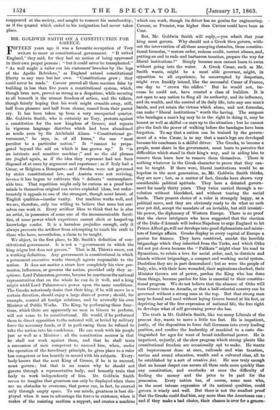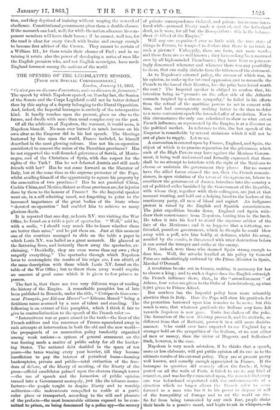MR. GOLDWIN SMITH ON A CONSTITUTION FOR GREECE.
FIFEEN years ago it was a favourite occupation of Tory NTvriters to sneer at constitutional government. "It suited England," they said, for they had no notion of being oppressed in their own proper persons ; "but it could never be transplanted." "As well might a tailor cut his customers' breeches by the legs of the Apollo Belvidere," as England extend constitutional liberty to any race but her own. "Constitutions grew ; they could never be made." Cavour proved all these maxims false by building in less than five years a constitutional system, which, though bran new, proved as strong as a despotism, while securing to all beneath it the utmost freedom of action, and the talkers, though faintly hoping that his work might crumble away, still, half from pleasure and half from shame, ceased from their parrot cry. It has been taken up from a very unexpected quarter. Mr. Goldwin Smith, who is certainly no Tory, protests against a constitution for the new kingdom of Greece, and repeats in vigorous language diatribes which had been abandoned as senile even by Sir Archibald Alison. "Constitutional go- vernment," he says, is, of all forms," the one "most peculiar to a particular nation." It "cannot be propa- gated beyond the soil on which it has grown up." It "is an intricate and sensitive machine ;" and so the old phrases are jingled again, as if the idea they represent had not been disposed of at once by argument and experience ; as if Italy had a Caesar, or Belgium a Bonaparte ; as if Sweden were not governed by strict constitutional law, and Austria were not reviving, because it has begun to cultivate this " delicate" untransplant- able tree. That repetition might only be curious as a proof how minds in themselves original can revive exploded ideas, but unfor- tunately it appeals to one of the strongest, though most latent, of English qualities—insular vanity. Our machine works well, and we are, therefore, only too willing to believe that none but our- selves can work it. Every artificer likes to think that he is also an artist, in possession of some one of the incommunicable facul- ties, of some power which experience cannot elicit or heaped-up knowledge confer. It is a harmless prejudice enough, only it always prevents the artificer from attempting to teach his craft to those who have, nevertheless, a claim to be taught.
We object, in the first place, to Mr. Smith's definition of con- stitutional government. It is not a "government in which the king reigns but does not govern." That is M. Thiers's sneer, not a working definition. Any government is constitutional in which a permanent executive works through agents responsible to the nation. It does not matter a straw how completely his view per- meates, influences, or governs the nation, provided only they ac - quiesce. Lord Palmerston governs, because he convinces the national representatives that on the whole he can do it well, and a king might wield Lord Palmerston's power upon the same conditions. The Greeks notoriously desire that their king, if he will move in a certain direction, should enjoy a large share of power ; should, for example, control all foreign relations, and be avowedly his own Minister of Public Works. The King, by performing those func - tions, which there are apparently no men in Greece to perform, will not cease to be constitutional. He would, if he performed them in direct opposition to the national will, or levied by military force the necessary funds, or if in perfcrming them he refused to take the nation into his confidence. He can work with his people just as well as a Minister ; all the constitution secures is that he shall not work against them, and that he shall train a succession of men competent to succeed him, when, under the operation of the hereditary principle, he gives place to a ruler less competent or less heartily in accord with his subjects. Every- body knows that the next King of Greece, if he is to succeed, must govern ; but that is no reason why he should not govern thrcugh a representative body, and honestly train that body to work independently of him. Mr. Goldwin Smith seems to imagine that greatness can only be displayed when there are no obstacles to overcome, that power can, in fact, be exerted only through empty space. To our minds, greatness is best dis- played when it uses to advantage the forces in existence, when it makes of the resisting medium a support, and creates a machine which can work, though its driver has no genius for engineering. Cavour, as Premier, was higher than Cavour could have been as Czar.
But, Mr. Goldwin Smith will reply,—you admit that your king must govern. Why should not a Greek then govern, with- out the intervention of all these annoying obstacles, these constitu- tional formulas, "restore order, redeem credit, correct abuses, and, putting an end to rude and barbarous taxation, prepare the way for liberal institutions ?" Simply because men cannot learn to swim without going into the water. A Greek Cmsar, such as Mr. Smith wants, might be a most able governor, might, in opposition to all experience, be uncorrupted by despotism, might even frankly intend, like the successful Caesar of France, one day to "crown the edifice." But he would not, be- cause he could not, have created a class of builders. It is not open to any nation to fling all its authority, and its influence, and its wealth, and the control of its daily life, into any one man's hands, and yet retain the virtues which alone, and not formulas, can make "liberal institutions" worth the having. The surgeon who bandages a man's leg may be in the right in doing it, may be honest as well as skilful—a man up to the situation ; but he cannot give the limb the power of walking before the bandages have been forgotten. To say that a nation can be trained by the govern- ment of a wise Csesar, is to say that a man's legs are developed because his coachman is a skilful driver. The Greeks, to become a people, must share in the government, must learn to perceive the difficulties which stand in their king's way, and in aiding him to remove them learn how to remove them themselves. - There is nothing whatever in the Greek character to prove that they can- not be taught. If there were, liberal institutions would be as hopeless in the next generation, as, Mr. Goldwin Smith thinks, they are now ; but, as a matter of fact, Greeks have shown very considerable political aptitude. They bore a detested govern- ment for nearly thirty years. They twice carried through a re- volution without bloodshed, and without tearing the social bonds. Their present choice of a ruler is strangely happy, as a political move, and they are obviously ready to do what no mob ever yet did, accept the mandate of an invisible, but still irresisti- ble power, the diplomacy of Western Europe. There is no proof that the clever intriguers who have suggested that the election of the Duke d'Aumale will induce Napoleon to urge England to let Prince Alfred go,will not develope into good diplomatists and minis- ters of foreign affairs. Greeks display in every capital of Europe a genius for finance. They have contrived, amidst the horrible brigandage which they inherited from the Turks, and which Otho did not put down because the " Palikars " might clear his road to Byzantium, to retain a love for social order, and, in districts and islands without brigandage, a compact and working social system. Doubtless they are in part demoralized ; but so were the people of Italy, who, with their hero wounded, their aspirations checked, their Minister thrown out of power, pardon the King who has done these things, because pardon for him is essential to their constitu- tional progress. We do not believe that the absence of Otho will turn Greece into an Arcadia, or that a half-oriental country can be governed without a strong man at the top. But that strong man may be found and used without laying Greece bound at his feet, or depriving her of the free expression of national life, the free right to develope what of self governing power she has.
as the most intense expression of its national qualities, could govern it wisely and well. But there is not the smallest proof
that the Greeks could find him, any more than the Americans can ; and if they make a bad choice, their chance is over for a genera-
tion, and they deprived of training without reaping the reward of obedience. Constitutional government gives them a double chance. If the monarch can lead, well; for while the nation advances its com- ponent members will learn their lesson ; if he cannot, well too, for the road is clear for every Greek with brains and energy enough to become first adviser of the Crown. They cannot be certain of a William III., let them retain their chance of Peel ; and in re- taining it retain also the power of developing a series of men like the English premiers who, and not English sovereigns, have made England foremost among the nations of the world.































 Previous page
Previous page